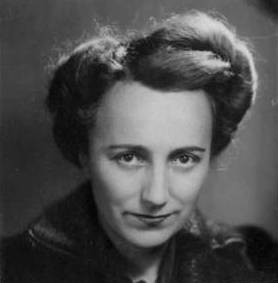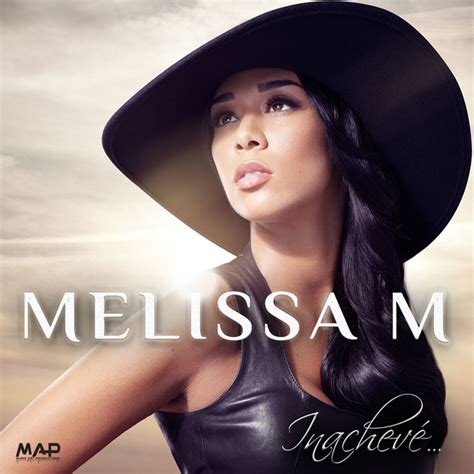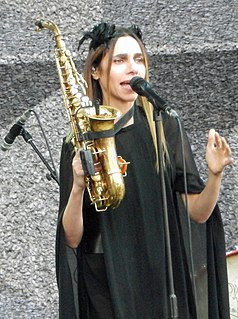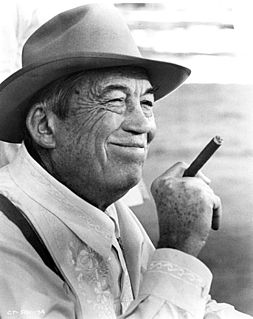A Quote by Sam Hamill
When these idiot rightwingers start complaining about poetry being political, I'm fond of reciting Sappho to them, who excluded men from her world. Why does she exclude them? Mostly because of their warmongering.
Related Quotes
An old woman I loved very much when I was young - the wife of Jean Villard - she's just reciting poetry all the time, which is beautiful because it means she went back to the world of poetry that she loved when she was young. That's all she does - she almost doesn't recognize her children, but she recites Valéry and Baudelaire. So what? We're the ones who are suffering. She's not.
And why does England thus persecute the votaries of her science? Why does she depress them to the level of her hewers of wood and her drawers of water? Is it because science flatters no courtier, mingles in no political strife? ... Can we behold unmoved the science of England, the vital principle of her arts, struggling for existence, the meek and unarmed victim of political strife?
Sappho is a great poet because she is a lesbian, which gives her erotic access to the Muse. Sappho and the homosexual-tending Emily Dickinson stand alone above women poets, because poetry's mystical energies are ruled by a hierach requiring the sexual subordination of her petitioners. Women have achieved more as novelists than as poets because the social novel operates outside the ancient marriage of myth and eroticism.
What's amazing to me is how many of the issues facing women in the ancient world still linger today. Take Odysseus' wife, Penelope, a brilliant, resourceful woman who ends up in a terrible situation: in her husband's absence, she is being held hostage in her own home by men who claim to be courting her. She tries to make them leave, but because she's a woman they refuse, blaming their bad behavior on her desirability.
I read a lot by female psychoanalyst Lou Andreas-Salomé, who wrote prominent biographies of Nietzsche, Rilke, and Freud because she studied with all of them. She had this unbelievable insight into contemporary psychoanalysis. What is so interesting is that she wrote her life, and she knew that her life would be about these men, and it didn't stop her from leading an incredibly successful academic career. But her strange self-awareness that she was going to bookmark these men's lives is really interesting to me.
Anais Nin shows an occasional grace in writing, but her work is quite foreign to me, precisely because she wants so much to be feminine and not feminist. And then she is so gaga before so many men. She talks about men I know in France, men who were less than nothing, and she considers them kings, extraordinary people.
I ask to become a faery because I love a faery queen, and because she deserves to have someone who loves her for who she is, not what she is. She needs me. There are people-good people-I love and I'm a liability to them because I'm a mortal. I'm fragile. I'm fine. I am in this world. People I care about, the woman I love, friends in all three of the courts This is where I belong. I just need you to give me what it takes to stay with them and be strong enough not to fail them.
Tibby sat on the outside of a group of kids in the film program. There was a lot of dark clothing and heavy footwear, and quite a few piercings glinting in sunlight. They had invited her to sit with them while they all finished up their lunches before film seminar. Tibby knew that they had invited her largely because she had a ring in her nose. This bugged her almost as much as when people excluded her because she had a ring in her nose.
People get anxious about dividing sorts of poetry, say Confessionalism from political poetry. But Confessionalism is very much an expression of racial privilege and of class privilege. I don't think it's always a blind expression of these privileges but it does have its genesis in them, in the politics of them.
Talk to them about things they don't know. Try to give them an inferiority complex. If the actress is beautiful, screw her. If she isn't, present her with a valuable painting she will not understand. If they insist on being boring, kick their asses or twist their noses. And that's about all there is to it.
I wondered about Mrs. Winterbottom and what she meant about living a tiny life. If she didn't like all that baking and cleaning and jumping up to get bottles of nail polish remover and sewing hems, why did she do it? Why didn't she tell them to do some of the things themselves? Maybe she was afraid there would be nothing left for her to do. There would be no need for her and she would become invisible and no one would notice.






































